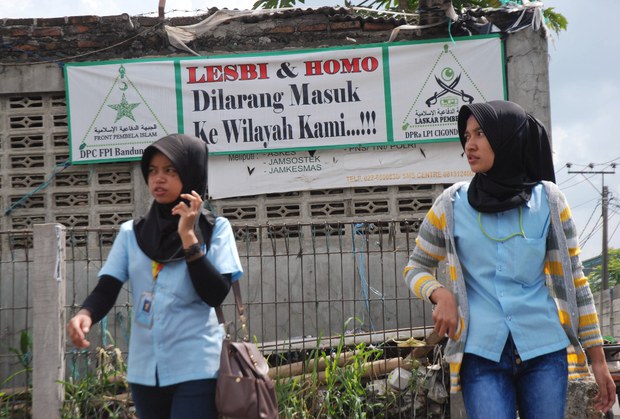Indonesian Court Considering Move to Make Gay Sex Illegal
2016.08.09
Jakarta
 Women walk past a banner that says “Lesbians and Homosexuals Forbidden to Enter Our Territority” in Bandung, Jan. 27, 2016.
Women walk past a banner that says “Lesbians and Homosexuals Forbidden to Enter Our Territority” in Bandung, Jan. 27, 2016.
A case being heard by an Indonesian court could make gay sex between consenting adults illegal if judges endorse a proposed revision of the nation’s criminal code.
There are no laws on the books on gay sex in Muslim-majority Indonesia, except in westernmost Aceh province, where sharia law is in effect.
LGBT people have been a visible and generally accepted subgroup in Indonesia, but they have come under pressure in recent years amid growing social conservatism.
In a petition submitted earlier this year, a civil society group called the Indonesian Family Love Alliance (AILA) asked the country’s Constitutional Court (MK) to review three articles in the country’s penal code, arguing that they are unconstitutional.
The one that concerns LGBT activists is article 292, which criminalizes same-sex acts between adults and minors. AILA wants to amend the article to include homosexual acts between adults.
The article states, “Adults who engage in same-sex obscene acts with an adolescent partner or someone who should have been properly perceived to be adolescent can face a maximum five years’ incarceration.”
AILA’s proposed revision of the clause states, “People who engage in same-sex obscene acts with persons of the same sex can face a maximum of five years’ incarceration.”
The MK cannot revise the criminal code, but acceptance of AILA’s petition would set a legal precedent and open the way for legislative and executive bodies to do so.
The case has already had five hearings since June 7.
“If the articles are amended to penalize [LGBT], they could trigger intolerant acts,” LGBT activist Dede Oetomo told BenarNews on Aug. 5.
“The law enforcers will have the ‘blessing’ to harass and discriminate if the review is approved,” said Dede, the founder of GAYa Nusantara, the first organization in Indonesia that campaigns for the rights and protection of homosexuals in the country.
Civilian rights activist Lies Marcoes agreed.
“We don’t want people to take the law into their own hands towards the LGBT people, if the Constitutional Court approves the reviews,” she said.
Legal certainty
AILA chairwoman Rita Hendrawati Soebagio dismissed the notion that revising the criminal code could promote intolerance.
She said harassment toward LGBT people stems from the lack of clear laws about homosexuality.
“If the laws are in place, the public would be aware,’ she said.
The group, based in the Jakarta area, promotes what it says are Islamic family values, campaigns against homosexuality and provides counselling to “heal” LGBT people.
Adrian Husaini, a lecturer on Islamic thought at the Ibnu Khaldun Bogor University and Higher Islamic Boarding School Husnayain Jakarta, agreed.
“Law enforcers so far are confused in the field because they don’t have the legal basis (to handle LGBT cases),” Adrian, who testified as an expert witness in the matter before the MK, told BenarNews.
“What we need to understand is that there is a moral standard in this country,” he added.
Other expert witnesses brought by the plaintiffs include physician Dewi Inong Irana, who spoke about treating sexually transmitted diseases in homosexual and transgender patients, and University of Indonesia legal expert Neng Djubaedah, who discussed the clauses in question and their links to religious teachings.
More testimony is scheduled for the next court hearing, on Aug. 23.
Dede Oetomo urged the MK’s nine justices to consider the ruling carefully.
“This is a test for the MK,” said Dede, “whether they would be wise to reach a decision that is based on science and human rights, instead of on the sectarian morality of a certain group.”
Vice chairwoman of the National Commission on Women (Komnas Perempuan) Masruchah urged the court to seek diverse opinions on the matter.
During the hearings to date, plaintiffs have tried a number of times to correlate this issue with health and psychiatric issues, she said.
“There should be (testimony) from other parties or experts who have different perspectives,” she said.







